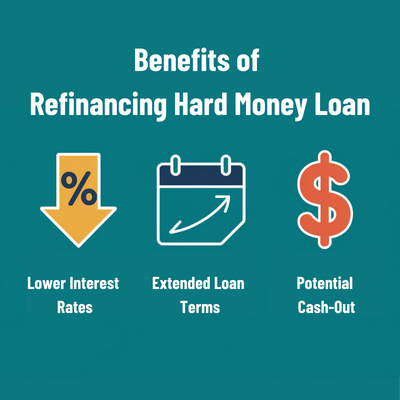
Hard Money Lenders vs Private Lenders
The lines between hard money and private loans often blur in real estate investing. This confusion can cause costly mistakes when choosing the right financing for your project.
In this article, CS Financial Group Inc. sheds light on these funding options, helping you strategize effectively.
Compare Hard vs. Private Money Lenders
Hard and private money lenders are good alternatives to bank financing. They are especially appealing to real estate investors. Both provide:
- Speed: Get funded faster than with banks.
- Flexibility: Enjoy more flexible terms and underwriting.
- Property value: Focus on the asset-based value and feasibility of the investment project.
Both Used for Projects:
- Fix-and-flip projects.
- Renovating projects to add value.
- Distressed Properties.
- Short-term loan needs.
In addition, in some cases, private money lenders can provide hard money loans. However, both lenders have different points:
Key Differences Of Hard Money vs Private Money Loans
Feature | Hard money loans | Private money loans |
Speed | Fast | Can be Fast |
Loan terms | More flexible than traditional loans | More flexible than hard money loans |
Risk of dispute | Lower than private loans | High (Ambiguous agreements) |
Relationship | Based on a clear approval process | Based on personal relationships |
Profiles lenders in California
Feature | Hard money loans | Private money loans |
Entity type | Licensed lending companies, mortgage funds, REITs, private lending companies | Individuals, organizations (family offices, private investment groups), licensed entities (DRE, CFL) |
Approval process | Primarily asset-based, prioritizing collateral and LTV | Relationships or experience, but still consider LTV and repayment ability. |
Capital source | Capital multiple sources (group of investors, lend company) | Individuals or organizations that use funds directly. |
Loan Terms and Costs in California 2024
Feature | Hard Money Loans | Private Loans |
8.5-12% for a 1st loan and 11% - 14% for a 2nd loan in 2024 | 9.5-12% for a 1st loan and 12-14% for a 2nd loan in 2024 | |
Points | Negotiable | |
Term Lengths | 6-24 months (typical) | Flexible (months to years) |
Minimum Loan Amount | Often standardized minimums | Negotiable |
Regulation and Legal Considerations in California
In California, private lenders and hard money lenders must follow lending laws. But, the regulation level varies.
Hard money lenders must be licensed (Real estate broker license) and often face stricter rules than private lenders. This is especially true for those licensed by the California DFPI.
These lenders must obey key federal laws. These are the Truth in Lending Act (TILA) and the Real Estate Settlement Procedures Act (RESPA). In addition, they may need additional certifications explicitly, such as (DFPI and NMLS).
Private lenders are generally less regulated. However, they must adhere to basic lending regulations and usury laws. These laws stop predatory lending and protect borrowers from high interest rates.
Relationship in communication
- Traditional banks: Structured processes, clear communication channels, and regular interactions (meetings, calls, email).
- Hard Money Loans: Focus on speed and efficiency. Communicate on key transaction aspects (terms, deadlines, and updates).
- Private Money Loans: Personalized service, flexible communication, and the potential for stronger relationships.
Individual lenders vary. Research, ask about their communication practices, and share your expectations. This will help you find the best fit.
Frequently Asked Questions
How do hard money lenders assess the value of a property?
Irvine, CA, lenders use the property’s ARV and LTV and the borrower’s experience to set the loan amount.
What are the differences between hard money and private lenders for real estate investors?
Hard money lenders are companies that specialize in short-term, asset-backed loans. Private lenders are usually individuals or groups that invest in real estate.
What real estate projects best suit hard money loans and private loans?
Hard money loans are best for short-term, quick projects like fix-and-flips. Private lending is better for long-term projects.
How do hard and private lenders’ loan terms and repayment schedules differ?
Hard money loans have shorter terms, often 12 months or less. Private lenders are more flexible with loan terms and repayment. They tailor loans to the borrower’s and project’s needs.
What are the requirements for hard money versus private loans?
Hard money lenders care more about a property’s value and a project’s potential profit than credit scores. Private lenders consider the borrower’s experience, project, and relationship.

Sandy Yuen is a certified mortgage broker. In 20 years of hard money lending, she’s funded over $450 million for investors. She specializes in fix-and-flip, bridge, and construction loans.
She also funds projects like second homes, apartments, and commercial and shopping centers. Sandy, a trusted lender, served over 500 clients in Irvine, CA. She is known for her fast approvals, flexible rates, and high transparency.
Share This Story!
Local & National
While we are based in Southern California, our reach is national. For the exception of a few states, we have funded loans all across America in some of the largest and most active metropolitan areas.
We have also worked with clients ranging from local, national, to global, helping them secure the right loan for their project.
Ready to Start?
Let’s being the process with a complimentary consultation. As we specialize in custom hard money loan solutions for our clients, we want to better understand your specific needs in order to offer you the best program available.
Please fill our inquiry form to get the process started!




